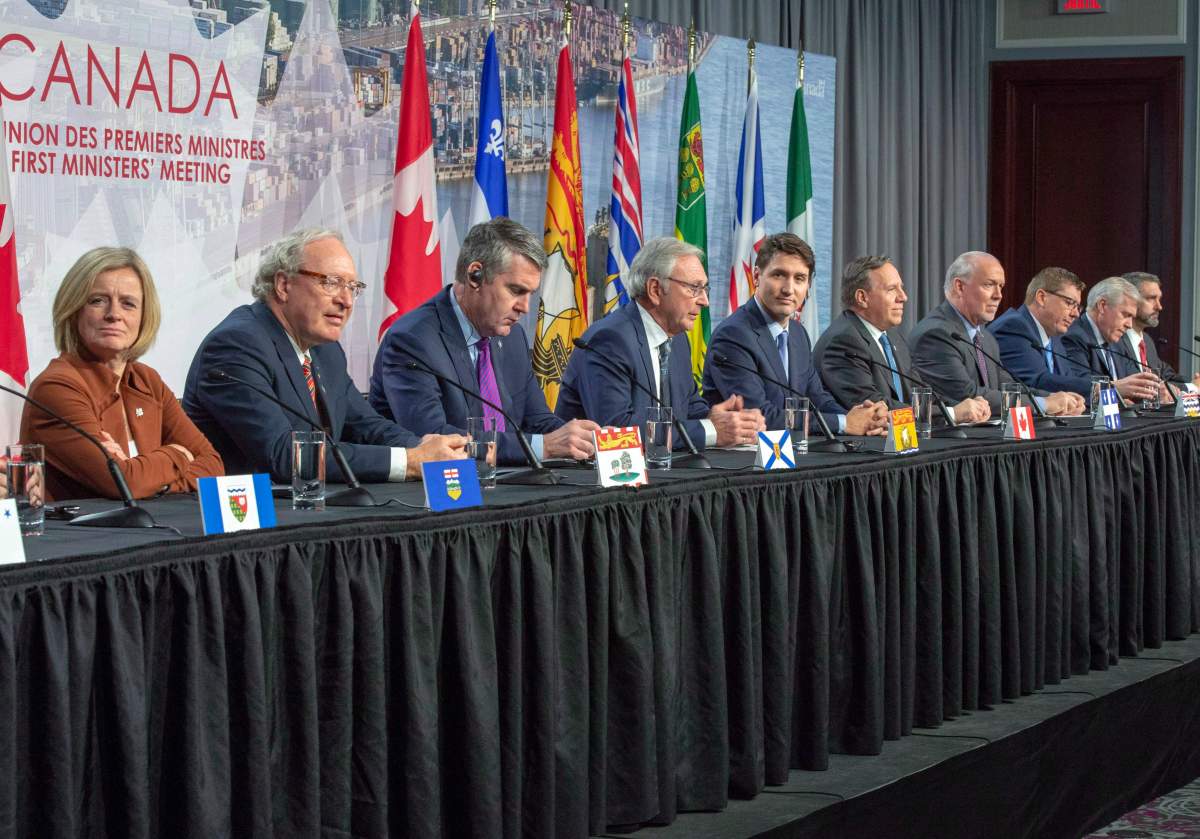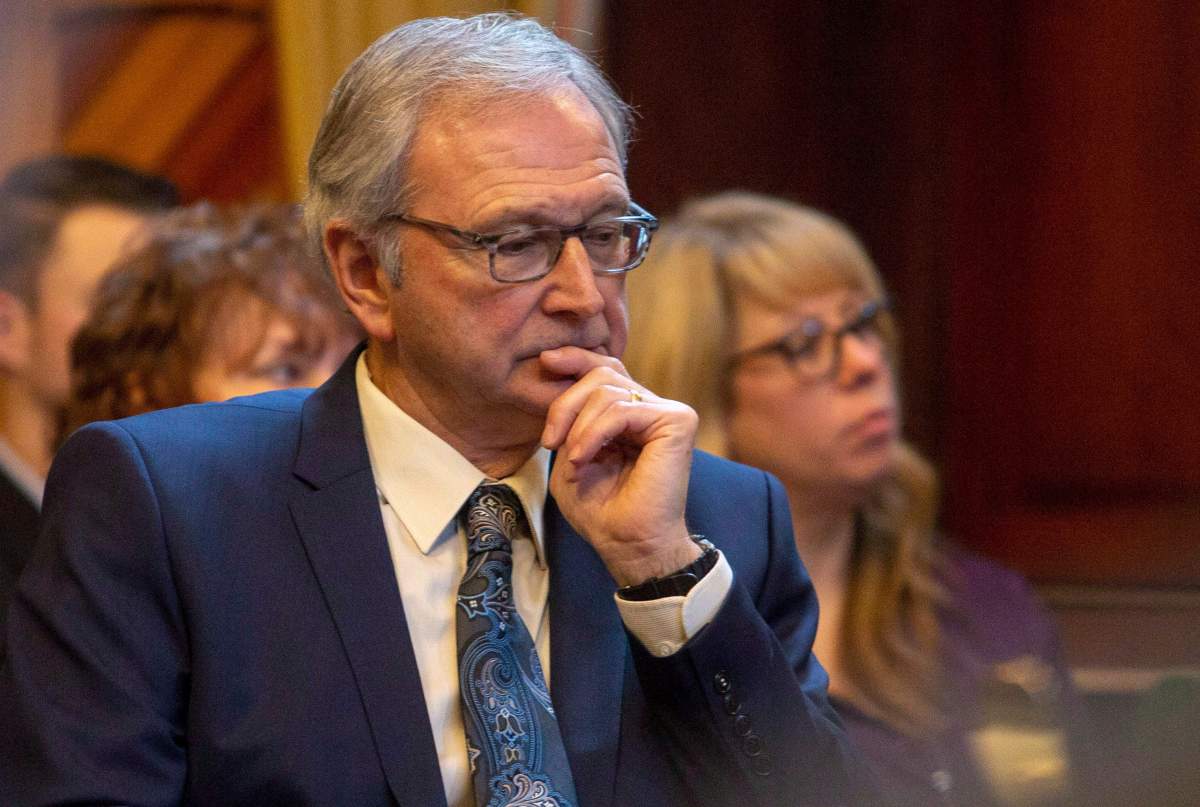The rookie Tory premier of New Brunswick has declared the Canadian federation fractured, with Ottawa and other provinces seemingly unconcerned about Alberta’s slump, and Quebec actively blocking economic development.

Blaine Higgs says he was shocked at the recent First Ministers meeting in Montreal to find there is no national urgency or strategy to deal with the 70 per cent devaluation of oil in Alberta.
READ MORE: Trudeau’s meeting with premiers does little to settle carbon, trade disputes
“Here’s a province that has fed many of our kids for years and we’ve all been happy to be recipients of that transfer payment. I’m not proud of that fact, and I would like to develop the very industry that they have,“ Higgs said in a year-end interview with The Canadian Press.
“But for us in that meeting, not to have that as the focal point a crisis in our country, as a serious impact on Alberta and potentially a serious impact on all of us, like it was just another day.“
Higgs is pushing to revive the cancelled $15.7 billion Energy East pipeline project that would have moved western crude to refineries in Eastern Canada and an export terminal in Saint John, N.B., but Quebec Premier Francois Legault is opposed to it passing through his province.
Legault recently provoked the ire of western Canadians when he said there was “no social acceptability” in his province for a “dirty energy” pipeline from Alberta.
READ MORE: Quebec premier doesn’t understand energy industry, Alberta finance minister says
His comments drew rebukes from pundits and western leaders such as Alberta Premier Rachel Notley, who said Legault “needs to get off his high horse.”
WATCH BELOW: Wed, Dec 12: Quebec Premier François Legault called Alberta oil “dirty energy,” setting off a war of words between himself and Alberta Premier Rachel Notley.
_848x480_1396388931535.jpg?w=1040&quality=70&strip=all)
Higgs, a former oil executive, is proposing that federal transfer payments be cut to force provinces to develop their natural resources.
“Here’s Premier Legault getting an increase, a cheque of more than $13 billion out of the $19 billion in transfer payments, and no real sense of urgency,“ Higgs said.

Get daily National news
He said that as a result of devalued oil, Alberta is losing $80 million a day, and all the provinces _ including New Brunswick _ should share in the pain through cuts in transfers.
“We should cut what goes to each province, based on our ability to get the resource to market,“ he said.
Higgs said the debate over Energy East demonstrates how the federation is fractured.
READ MORE: Equalization payments — how they work, and why some provinces are upset
“So with Alberta, Manitoba, Saskatchewan, Ontario and ourselves — we are very much aligned— and Quebec in the middle in this case for transportation from west to east is not only disappointing, it’s really shocking,” he said.
“I saw a willingness through every province but I didn’t see that willingness in Quebec.“
WATCH: Alberta small business confidence low going into holiday season

Higgs said there should be a utility corridor across the country that could house pipelines, power transmission lines, and communication systems. He said, like the national railway, it would be a right-of-way through the country.
Higgs said another area where the federation is fractured is with the way provinces are being treated differently by Ottawa when it comes to the carbon tax, which goes into effect next year. He said it is far from a level playing field, because the provinces are being asked to meet the same targets despite starting from different carbon-emission levels.
READ MORE: Saskatchewan says federal government not doing enough to resolve western oil crisis
New Brunswick is an intervener in legal challenges launched by Saskatchewan and Ontario and has launched its own legal challenge of the carbon tax.
He said the proposed federal backstop — the tax Ottawa will impose in provinces without their own carbon taxes — puts New Brunswick at a disadvantage, and if it remains in place, New Brunswickers will be paying the country’s highest tax on gasoline by 2022.
Higgs won a minority government in this fall’s election, having run on a platform of fiscal responsibility. The Liberals tried to cling to power, but were defeated in a confidence vote on their throne speech after the three members of the upstart People’s Alliance party agreed to support the Tories on confidence votes for at least 18 months.
Looking out his office window at the spectacular view of the provincial legislature and the Saint John River, Higgs said he doesn’t take his time as premier for granted.
“I took a picture of the view because I could only be here a short time,“ he said.
WATCH: Trudeau discusses Alberta oil crisis and Western alienation

Higgs, a 64-year-old engineer and former finance minister, was hired by Irving Oil a week after he graduated from the University of New Brunswick. He was eventually promoted to director of distribution, overseeing oil transportation across eastern Canada and New England.
READ MORE: Quebecers prefer to import oil from Western Canada, according to Leger poll
Higgs said he needs to administer some tough fiscal medicine right away in order to get quick results. He points to his decision to slash $265 million from capital spending plans the previous Liberal government had in place.
“I do want to make things happen in a hurry, but that’s kind of my nature. I like to look at an issue, look at the facts, and then get on with it, and not spend time going around and around.“
He is vowing to balance the budget in the spring in an effort to avoid a downgrade of the province’s credit rating.
“I do not want to pay more interest. I would rather have $25 to 30 million a year going into service delivery than interest payments,“ Higgs said.
Higgs said the province’s finances and the creation of a customer service focus for government are his priorities for 2019.









Comments